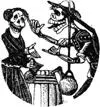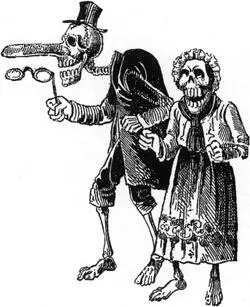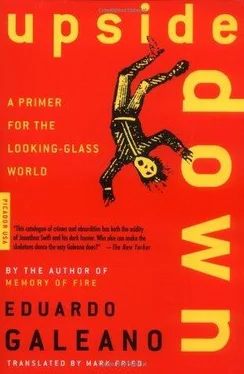The grandchildren, the kids, the ones who speak pretty, speak like the TV.
Peter Menzel and other photographers compiled a book of families from all over the planet. Their portraits of family intimacy in England and Kuwait, Italy and Japan, Mexico, Vietnam, Russia, Albania, Thailand, and South Africa are quite different. But all these families have something in common and that something is television. There are 1.2 billion TV sets in the world. Recent surveys in the Americas, from north to south, reveal the omnipresence and omnipotence of the small screen:
• in four out of ten homes in Canada, parents are unable to recall a single family meal eaten without the TV on
• tied to the electronic leash, children in the United States spend forty times as many hours watching TV as talking to their parents
• in most homes in Mexico, the furniture is arranged around the television
• in Brazil, one-fourth of the population admits they would not know what to do with their lives if television did not exist.
Working, sleeping, and watching television are the three activities that eat up most of people’s time in today’s world — something politicians are well aware of. This electronic network, which brings the pulpit into millions and millions of homes, delivers an audience bigger than any ever dreamed of by the many preachers the world has produced. The power of persuasion depends not on content — the greater or lesser truth of the message — but rather on imagery and the efficacy of the ad blitz to sell the product. Detergents are pushed at shoppers the same way presidents are pushed at the public. Ronald Reagan was the first telepresident in history, a mediocre actor who, in his long years in Hollywood, learned how to lie with sincerity before the camera’s eye and whose velvet voice won him a job as spokesperson for General Electric. In the era of television, Reagan needed nothing else to have a political career. His ideas, not very numerous, came from Reader’s Digest. (Writer Gore Vidal observes that the complete set of Reader’s Digest was as important to Reagan as the collected works of Montesquieu were for Jefferson.) With the help of the small screen, President Reagan was able to convince the U.S. public that Nicaragua was a threat. Standing in front of a map of North America with a red stain slowly spreading up from the south, Reagan demonstrated that Nicaragua was planning to invade the United States through Texas.

After Reagan, other telepoliticians started winning. Fernando Collor, once a model for Christian Dior, became the president of Brazil in 1990 thanks to television. The same TV that produced him and blocked a victory of the left overthrew him a couple of years later. The rise of Silvio Berlusconi to the summit of political power in Italy in 1994 would be inexplicable without television. Berlusconi exercised influence over a vast TV audience after he obtained, in the name of democratic diversity, a monopoly on private television. It was that monopoly, along with his success as the owner of the Milan soccer club, that provided an effective catapult for his political ambitions.
In every country, politicians fear being punished or shut out by television. On the news and on the soap operas, there are heroes and villains, victims and executioners. No politician likes to play the bad guy, but bad guys at least get covered. It’s far worse to be ignored. Politicians are terrified that television will fail to notice them, condemning them to civic death. Whoever does not appear on TV does not exist in reality; whoever disappears from TV leaves the world. To have a presence on the political stage, you have to appear with a certain regularity on the small screen, and that regularity, not easily achieved, does not tend to come free. The owners of television offer politicians a platform, and the politicians return the favor by offering the owners impunity; without fear of retribution, they can continue placing a public service at the service of their private pocketbooks.

Politicians are not unaware, can’t afford the luxury of being unaware, of the low standing of their profession and the magical, seductive power that television, and to a much lesser degree radio and the press, exercise over the multitudes. A poll taken in several Latin American countries in 1996 confirmed what you hear in the streets: nine out of ten Guatemalans and Ecuadorians have a poor opinion or worse of their parliamentarians, and nine out of ten Peruvians and Bolivians do not trust political parties. In contrast, two out of three Latin Americans believe what they see and hear in the media. José Ignacio López Vigil, an activist in alternative media, summed it up well: “In Latin America, if you want a political career, your best option is to become a TV anchor, a radio host, or a singer.”
To win and consolidate popular legitimacy, some politicians take direct control of television. The most powerful and conservative of Brazilian politicians, for example, Antonio Carlos Magalhães, graciously received a concession for private TV in the state of Bahía, and in his fiefdom he runs a virtual monopoly in association with Rede Globo, the Brazilian television giant. Lidice da Mata, the mayor of Bahía, was elected by the voters of the Workers Party, a powerful force that is a party of the left and, what’s worse, is proud of it. In 1994, the mayor complained that she was never able to get on Magalhães’s stations, not even with paid ads or when there were floods, mud slides, strikes, or other emergency situations that required urgent communication with the public. Bahía’s television, a magic mirror, reflected only the face of its owner.
There are channels that claim to be public in many Latin American countries, but that’s just one of the things states do to run down the reputation of the state. With a few heroic exceptions, state programming goes over like a lead balloon; thanks to Paleolithic equipment and ridiculous salaries, the picture is often fuzzy. Only private television has the means to capture a mass audience. Throughout Latin America, this prodigious source of money and votes lies in a few hands. In Uruguay, three families own all private TV. This family oligolopoly swallows money and spits out advertisements, buys canned programming from other countries for a pittance, and rarely gives work to local artists or runs the risk of producing a quality program of its own; when that miracle occurs, theologians claim it as proof of the existence of God. Two big multimedia conglomerates control the lion’s share of Argentina’s television. In Colombia two groups hold television and most other important media in their hands. Televisa of Mexico and Rede Globo of Brazil are absolute monarchies barely disguised by the existence of other minor kingdoms.

Praise for Imagination
A few years ago, the BBC asked British children if they preferred television or radio. Nearly all favored TV, a finding on the order of saying that cats meow or that dead bodies don’t breathe. But among the few children who chose radio, there was one who explained, “I like radio better, because I see prettier pictures.”
Latin America is a very lucrative market for the U.S. image industry. It consumes a lot of television and produces little other than a few news shows and successful soap operas. Soap operas, which the Brazilians do wonderfully, are Latin America’s only TV export. Once in a while they take up topics from this world, like political corruption, drug trafficking, street children, or landless peasants, but the president of Mexico’s Televisa put his finger on what makes soap operas so big when he explained at the beginning of 1998: “We sell dreams. We have no intention of reflecting reality. We sell dreams like Cinderella’s.”
Читать дальше














